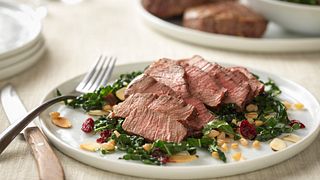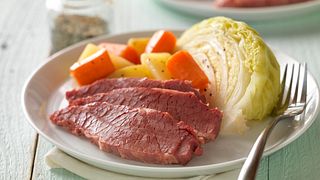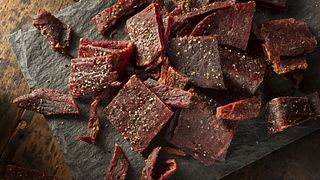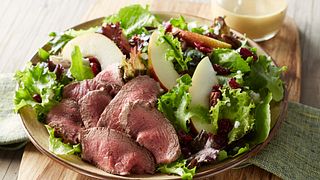Higher-protein Weight Loss Diet Including Lean Beef Helps Achieve Important Health Goals
Hillary Makens | July 6, 2017
New research shows lean beef can help people lose weight while maintaining lean muscle and supporting a healthy heart
New research published in Obesity Science & Practice shows that as part of a healthy and higher-protein diet, lean beef can help people lose weight while maintaining muscle and a healthy heart.1 The Beef WISE Study: Beef’s Role in Weight Improvement, Satisfaction, and Energy, conducted at the University of Colorado with a research grant from the beef checkoff, adds to the growing body of evidence demonstrating lean beef can contribute to a healthy weight loss diet.
While the popularity of higher-protein diets has grown considerably, there is often guidance telling people to limit red meat as a protein source. However, few studies have compared different high-quality protein sources to understand their effectiveness in a weight loss or maintenance diet. Dr. Drew Sayer, PhD, and his colleagues at the University of Colorado Anschutz Health and Wellness Center sought to understand the effectiveness of lean beef, compared to other protein sources, on measures of health in a higher-protein diet, such as weight loss and muscle mass maintenance, as well as impact on cardiovascular disease risk factors.
Lean beef as effective as other proteins for weight loss potential
The Beef WISE Study engaged 99 overweight or obese adults in a comprehensive weight management program called State of Slim for 16 weeks that emphasized behavioral strategies to make lasting healthful changes in diet and physical activity to promote optimal health and wellness.
In addition to participating in regular moderate-intensity exercise, study participants were separated into two groups that followed the higher protein diet. One group consumed four or more servings of lean beef each week and the other group was restricted from eating red meat. Subjects in both groups lost equal amounts of body weight and fat mass while preserving muscle.
“A key finding of this study is that 90 to 95 percent of the weight lost came from fat, not muscle,” said Dr. Sayer. “This shows that lean beef doesn’t have to be restricted in a higher-protein diet and is just as effective as other protein choices in supporting healthy weight loss and leaner bodies.”
Growing evidence on lean beef and heart health
All study participants, including those who consumed lean beef four or more times a week, as part of the healthy, higher-protein diet in combination with exercise, showed improvements in their total and LDL cholesterol and blood pressure metrics, indicating the lean beef did not negatively affect their heart health.
The Beef WISE Study contributes to the growing body of research demonstrating the role of lean beef in heart-healthy diets and strong bodies. This includes a study called BOLD (Beef in an Optimal Lean Diet), which demonstrated that adding lean beef to the well-established Dietary Approaches to Stop Hypertension (DASH) diet lowered heart disease risk by reducing levels of total and LDL cholesterol.2
Protein and weight loss
A substantial body of evidence shows the nutrients in beef, such as high-quality protein, can help satisfy hunger and maintain a healthy weight, build and maintain muscle, and fuel a healthy and active lifestyle.3456 Beef is an important source of nutrients, including iron, zinc and B-vitamins, for optimal health.
“Losing weight is not easy. Neither is maintaining a healthy weight, particularly as we age. We know people succeed most often when they make small changes they can stick with,” said Shalene McNeill, PhD, RD, Executive Director of the Human Nutrition Research Program at National Cattlemen’s Beef Association, a contractor to the Beef Checkoff. “This study is great news for people who enjoy beef, but might have been told to avoid it while following weight loss diets. It underscores, once again, lean beef can be part of a healthy, higher-protein diet for weight loss.”
People can incorporate 3- to 4-ounce servings of lean beef, supplying about 30 grams of protein, in simple recipes, such as Grilled Southwestern Steak, Classic Beef Kabobs, Hearty Steak and Bean Chili and Beef, Mango & Barley Salad.
About the Beef Checkoff
The Beef Checkoff Program was established as part of the 1985 Farm Bill. The checkoff assesses $1 per head on the sale of live domestic and imported cattle, in addition to a comparable assessment on imported beef and beef products. States may retain up to 50 cents on the dollar and forward the other 50 cents per head to the Cattlemen's Beef Promotion and Research Board, which administers the national checkoff program, subject to USDA approval.
About NCBA, a Contractor to the Beef Checkoff
The National Cattlemen's Beef Association (NCBA) is a contractor to the Beef Checkoff Program. The Beef Checkoff Program is administered by the Cattlemen's Beef Board, with oversight provided by the U.S. Department of Agriculture.
- • Sayer RD, et al. Equivalent reductions in body weight during the Beef WISE Study: Beef’s Role in Weight Improvement, Satisfaction, and Energy. Accepted by Obesity Science & Practice 2017, Available at: http://onlinelibrary.wiley.com/doi/10.1002/osp4.118/full
- • Roussell MA, et al. 2012. Beef in an Optimal Lean Diet study: effects on lipids, lipoproteins, and apolipoproteins. Am J Clin Nutr. 95:9-16.
- • Westerterp-Plantenga MS, et al. 2006. Dietary protein, metabolism, and body-weight regulation: dose–response effects. Int J Obes. 30:S16-S23.
- • Paddon-Jones D, et al. 2008. Protein, weight management, and satiety. Am J Clin Nutr. 87:1558S-61S.
- • Paddon-Jones D, et al. 2008. Role of dietary protein in the sarcopenia of aging. Am J Clin Nutr. 87:1562S-6S.
- • Wolfe, R. 2006. The underappreciated role of muscle in health and disease. Am J Clin Nutr. 84:475-82.






